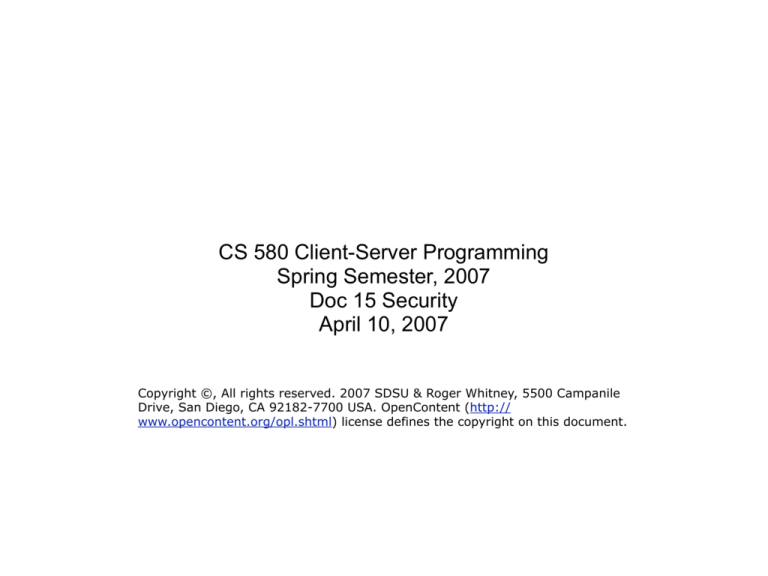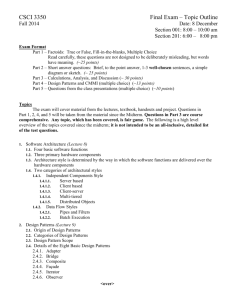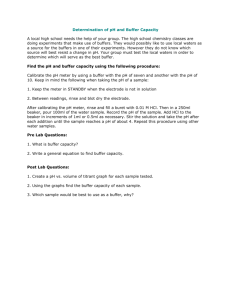
CS 580 Client-Server Programming
Spring Semester, 2007
Doc 15 Security
April 10, 2007
Copyright ©, All rights reserved. 2007 SDSU & Roger Whitney, 5500 Campanile
Drive, San Diego, CA 92182-7700 USA. OpenContent (http://
www.opencontent.org/opl.shtml) license defines the copyright on this document.
References
SQL Injection - http://en.wikipedia.org/wiki/SQL_injection
Buffer Overflow - http://en.wikipedia.org/wiki/Buffer_overflow
NIH Security Web Site http://www.alw.nih.gov/Security/security.html
Applied Cryptography Second Edition, Bruce Schneier, John Wiley & Sons, 1996
Red Team versus the Agents, Scientific American, December 2000, pp. 20, 24.
2
Security ≠ Cryptography
Kevin Mitnick often got people’s passwords by asking
3
Some Problems Require Global Solution
Denial of Service Attacks
4
Some Bad Ideas
Security by Obscurity
Security in the wrong place
Authentication without checking
Back doors
5
Security through Obscurity
Security relies on encryption/authentication methods are not obvious
Reverse the byte order of a message
Swap bytes in some "secret" way
Add garbage to data
Use some "secret" algorithm
Just because you cannot break the encryption does not mean others can’t
6
Security in the Wrong Place
Regardless of what client does server must authenticate/check
7
Back doors
Programmers have the tendency to add debug code to their servers to make testing easier.
This debug code may circumvent any security features of the server.
Example - sendmail "WIZARD"
Wizard command gave full root privileges to the user
The default distribution had this command enabled
The "Internet worm" used this to attack machines throughout the Internet.
Sandia National Labs Security Agents Software
Agent software based on Lisp
Agents could perform any Lisp string
Agents could request other agents to perform tasks
Intruders could masquerade as an agent
8
Some Common Attacks
Buffer Overflow
SQL Injection
Running scripts
9
Buffer Overflow
Overflow a buffer to
change data in other variables
Execute code from buffer
10
Buffer Overflow Example Code
#include <stdio.h>
#include <string.h>
int main(int argc, char *argv[])
{
char buffer[10];
if (argc < 2)
{
fprintf(stderr, "USAGE: %s string\n", argv[0]);
return 1;
}
strcpy(buffer, argv[1]);
return 0;
}
Source http://en.wikipedia.org/wiki/Buffer_overflow
11
Buffer Overflow Solution 1
Check the Buffer Size
#include <stdio.h>
#include <string.h>
int main(int argc, char *argv[])
{
char buffer[10];
if (argc < 2)
{
fprintf(stderr, "USAGE: %s string\n", argv[0]);
return 1;
}
strncpy(buffer, argv[1], sizeof(buffer));
buffer[sizeof(buffer) - 1] = '\0'; /* explicitly write a string terminator */
return 0;
}
12
Buffer Overflow Solution 2
Use a language that checks for array out-of-bounds errors
Java
Smalltalk
Ruby
Python
13
SQL Injection
"SELECT * FROM users WHERE name = '" + userName + "';"
let username be
a’ or ‘t’ = ‘t
SELECT * FROM users WHERE name = 'a' or 't'='t';
This is always true
let username be
a’; DROP TABLE users; Select * FROM data where name = ‘a
SELECT * FROM users WHERE name = 'a' ’;
DROP TABLE users;
Select * FROM data where name = ‘a’;
14
Preventing SQL Injection In Java
Replace
Connection con = (acquire Connection)
Statement stmt = con.createStatement();
ResultSet rset = stmt.executeQuery("SELECT * FROM users WHERE name = '" + userName + "';");
with
Connection con = (acquire Connection)
PreparedStatement pstmt = con.prepareStatement("SELECT * FROM users WHERE name = ?");
pstmt.setString(1, userName);
ResultSet rset = pstmt.executeQuery();
SQl Injection examples from http://en.wikipedia.org/wiki/SQL_injection
15
Running Scripts
Some systems allow users to enter a script to be executed
If you need this be very careful on what a script can do
Text
16







